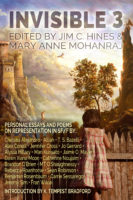Our Hyperdimensional Mesh of Identities, by Vic Vieira Ramires
“There is a common poor attempt at a joke … that consists purely in stringing together a series of marginalized identities and calling attention to it … as if the mere existence of someone like that would be so absurd it could only be laughable.”
 Vic Vieira Ramires is one of the contributors to Invisible 3, which came out on June 27 and includes 18 essays and poems about representation in science fiction and fantasy. You can order the collection at:
Vic Vieira Ramires is one of the contributors to Invisible 3, which came out on June 27 and includes 18 essays and poems about representation in science fiction and fantasy. You can order the collection at:
Amazon | B&N | Kobo | iBooks | Smashwords | Google Play
Any profits from the sale of the collection go to Con or Bust, helping fans of color to attend SF/F conventions.
As with Invisible and Invisible 2, the contributors to this third volume have shared work that’s heartfelt, eye-opening, honest, thoughtful, and important…not to mention relevant to so much of what we see happening in the genre today.
#
Our Hyperdimensional Mesh of Identities
Growing up in the 90s and early 00s in the south-east of Brazil, all I saw in mainstream media were the same repetitive, harmful and offensive stereotypes about travestis in telenovelas and badly written comedy TV shows, and the effeminate gay men and macho lesbian women token characters whose non-conforming gender expression was grossly caricatured for cheap laughs.
As an openly queer young girl in school, I learned that I could be queer, but not too much, not too visibly. I’ve heard those laughs, and I internalized through bullying and ridicule that I should change how I presented myself to the world—which I did really fast by becoming the stock image of a non-threatening feminine girl, although I never hid my sexuality. My first awkward attempts at a masculine gender expression didn’t have time to blossom. I shoved it down some unreachable recess of my mind and avoided it for 10 years, which (along with compulsive heterosexuality and a binary cisnormative culture) is why it took me so long to understand my bisexuality and figure out my transmasculine non-binary gender identity.
Once I did, I uncovered a gender euphoria I’ve been cultivating ever since.
It took me years to understand the ways in which I inhabit my queer transmasculine genderfluid neuroatypical body, and my most powerful illumination came unexpectedly through the stories of a queer non-binary neuroatypical green witch: Elphaba Thropp, the Wicked Witch of the West.
 I first met her in the book series The Wicked Years by Gregory Maguire, where most aspects about her gender and sexuality were ambiguous or obscured between the lines, and later in fan fiction, where the depths of Elphaba’s intersectional identities (canon or not) could be explored to the fullest by writers that shared those same identities.
I first met her in the book series The Wicked Years by Gregory Maguire, where most aspects about her gender and sexuality were ambiguous or obscured between the lines, and later in fan fiction, where the depths of Elphaba’s intersectional identities (canon or not) could be explored to the fullest by writers that shared those same identities.
Despite being an avid reader of speculative fiction since childhood, it was only after these encounters with trans and non-binary characters in fan fiction during the first half of my twenties that I started researching these topics, that I found out where I belonged. I discovered a thriving community of authors from marginalized groups creating astonishing rebellious versions of every world I’ve ever dreamed of and countless others I couldn’t imagine would be paramount to my process of liberation.
I owe it mostly to the fictional characters and their creators that illuminated me—from early readings like Virginia Woolf’s Orlando to the most recent fan fiction stories about a non-binary autistic Elphaba, a genderfluid bisexual Korra (from The Legend of Korra), and an agender transhumanist Root (from Person of Interest). I wish I could’ve met them sooner. Along the way to self-discovery, I had to collect all sorts of missing pieces with jagged edges and weird fractal shapes, and figure out a way to put them together myself. I was lucky to stumble upon the stories that I did and then to be able to find the communities that I needed. That’s why representation is vital. You cannot search for something you don’t even know exists.
There is a common poor attempt at a joke (that I’ve seen in both Anglophone and Brazilian online spaces), often directed at dehumanizing non-binary people and mocking activists working at the multidimensional core of intersections, that consists purely in stringing together a series of marginalized identities and calling attention to it, using the accumulation of these identities as a joke in and of itself, as if the mere existence of someone like that would be so absurd it could only be laughable.
One of the things fantasy author Jim Anotsu and I wanted to acknowledge when we wrote the Manifesto Irradiativo—our call to diversity and representation in Brazilian speculative fiction—is that our lives cannot be reduced to an isolated shelf in a bookstore or a niche market, thus we cannot be constrained to discussing the realities of our identities in those compartmentalized terms. We’re so much more than single-issue stories, than the same old one-dimensional narratives constructed to serve the gaze of the oppressor without making them examine their privileges and dismantle their systems of violence.
Those single-issue stories exist and persist for several reasons concerning the maintenance of racial, economic, and social power, amongst them because there is a fear of “too much” diversity. As if a book about a bipolar asexual bigender Afro-Brazilian person, for example, would scare away or alienate the common reader—who is always presumed to be the neurotypical cis straight white default that can handle only one unit of diversity at a time, served lukewarm, unseasoned. But as Audre Lorde said in a 1982 speech at Harvard University: “There is no such thing as a single-issue struggle because we do not live single-issue lives.”
Stories matter. And we shouldn’t have the full extent of our existences cut, segregated, and dimmed in them. We deserve to live as a hyperdimensional mesh of identities when they want to flatten us, to be loud when they want to silence us, to occupy the spaces that have been negated to us, and to be wonderfully written and represented as such.
***
Vic Vieira Ramires is a queer non-binary autistic Brazilian writer, translator and visual artist working in the realms of the weird and the eerie. They’re the author of Metanfetaedro and various short stories published in SFF collections and on the web. Find them at https://vicverso.com.br.






